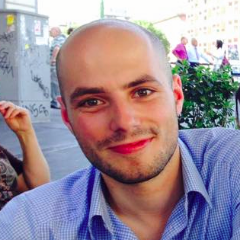Nello Santi’s career has bloomed late at La Scala. The 86-year-old conductor is revered for his cultivated interpretations of Verdi, but before this year he had appeared at the Milan house only once, in 1971. Now he is a regular: after conducting this season’s run of La traviata, Santi was back for Daniele Abbado’s production of Nabucco. It was a performance that had you lickng your lips for Santi's return next season with Zeffirelli’s time-honoured take on Aida.
The conductor was enthusiastically received even before the music started, not least by an open-armed audience member who strode toward the pit to welcome him back. When the overture finally began, it was clear that this would be a special performance. The solemn brass trickled, the lyrical strings flowed and the driving rhythms exploded.
Santi evokes a rough-around-the-edges sound comprising piquant winds and rugged strings – a contrast to the smoothed-out sheen of Muti, for example – that coalesces in a natural reading that is proportioned yet abundant with colour. “Va pensiero” had special but understated dignity. The livelier portions of the score were made to fizz with life, but always felt measured. Indeed, one does not have the sense of listening to a particular conductor’s impression of the work, but of hearing the work speak plainly for itself.
Apparent criticism of Santi’s pacing – “the tempi maestro!” came a lone cry from the loggionisti after the interval, just as with La traviata last March – felt unwarranted. Santi applies a relatively firm grip on the reins, but the music sounds spry rather than plodding. His barely imperceptible rallentandi between the musical joins are carefully weighted to give the music a sense of flow.
Leo Nucci as Nabucco provided accompanying veteran talent on the stage itself, replacing Placido Domingo who had played the role during the London runs of the production. The 75-year-old baritone remains in remarkably good nick: his voice retains its gorgeous, oaky core and is impressively large, resonating fully from top to bottom and filling the auditorium. Nucci’s longevity is surely the result of a solid technique: he negotiates the passaggio beautifully, for example, to slide smoothly into a creamy upper register. What he has acquired over the years is dramatic presence. From his rabble-rousing entry to his descent to madness, this was an engrossing interpretation.
Martina Serafin as Abigaille combined strong dramatisation with a steely tone, particularly impressive as she raged through her aria “Salgo già del trono aurato”. Annalisa Stroppa was poignant as Fenena, displaying a powerful yet lambent tone in her prayer “O dischius'è il firmamento”. But there was little hint of complicity or attraction between Fenena and Ismaele, which was less a result of tenor Stefano la Colla’s solid if tame performance than of the obstacles presented by Abbado’s bland production.
Still, there was no repressing the deep, bronze voice of Mikhail Petrenko as Zaccaria, who railed mightily in “Come notte a sol fulgente” amid roars from the chorus – on powerful, snappy form throughout.
Indeed, when the music was so enjoyable one hardly minded that the staging was so poor. Abbado sets us in the 1940s, opening in an ambiguous setting evocative both of a cemetery the Holocaust memorial in Berlin. While Abbado makes much use of background projections, not much happens on stage and everything feels static. This was therefore an evening to shut your eyes and enjoy Verdi’s score in the hands of a special maestro.




